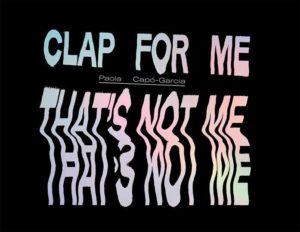In Their Own Words
Paola Capó-García on “Yellow”

Yellow
"Dirty is yellow."
— Gertrude Stein
When I was young I thought the soul was a body part
To the right of my heart and in between the pre-breasts
this soul-thing would nest—and then one day it fell out?—
No It stuck around too long
and made a house of my insides The walls were
yellow which I now know is the color of hunger and
that's why I crave baby chicks and gold There
was so much furniture shoved inside of me and even if
the décor was mid-century, the style was mortal My
memory is hungry She wanted me to paint my face
every morning Makeup could enhance better
make use of this face But then my dog licked the second
face off clean That is my favorite movie
From CLAP FOR ME THAT'S NOT ME (Rescue Press, 2018). All rights reserved. Reprinted with the permission of the author.
On "Yellow"
When I was young, I actually did think the soul was a body part. I chalk this up to not understanding abstraction at a young age. Everything was literal to me. I thought that because my mother was alive at the same time as Elvis, naturally they must have met at some point.
This poem was born from that childhood misunderstanding, but evolved via Gertrude Stein. At a job interview I was once asked how I would describe the color yellow to a blind person. Problematic as that question was, I answered "dirty," to quote Stein (note: I got the job). I've always loved how Stein treated language as an object to be looked at, like still lifes. But Stein's still life language is mutable, so I wanted language and narrative here to shift and disorient, to never stay in one place. I wanted this version of the soul to overstay its welcome and explode within the body, to make itself comfortable. Comfort and coziness are often main characters in my poems. Here they inhabit the body in mid-century digs. The poem then shifts to the outer body (the face), the thing most seen and performed. The last line was meant as an inside joke with myself referencing the John Travolta/Nicolas Cage movie, Face/Off. What better example of the performativity and pressures of inhabiting a body than a movie where Nicolas Cage is John Travolta is Nicolas Cage?
In terms of this poem's relationship to CLAP FOR ME THAT'S NOT ME, I see it as one of its most important corners. It's a poem that cements a lot of the book's concerns (e.g., identity, memory, materiality, humor, etc.), while trying to communicate the speaker's inability to truly confront the world. That backing away at the end—the resistance to take something seriously—is the speaker's self-preservation and self-destruction.



